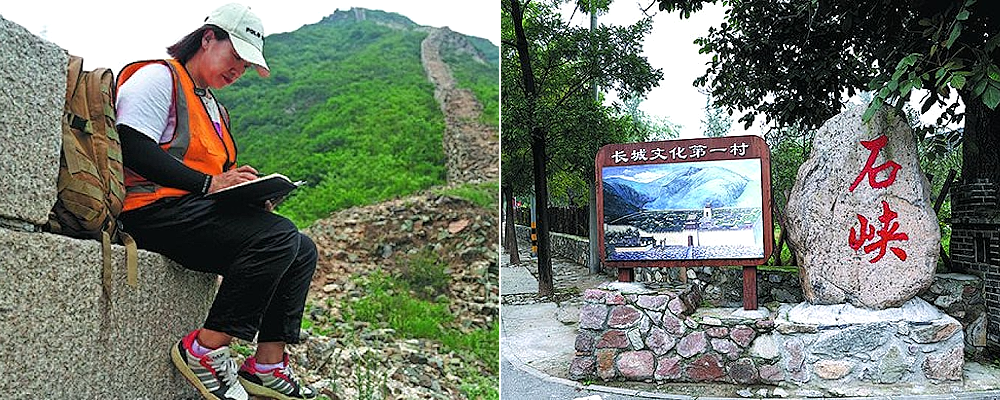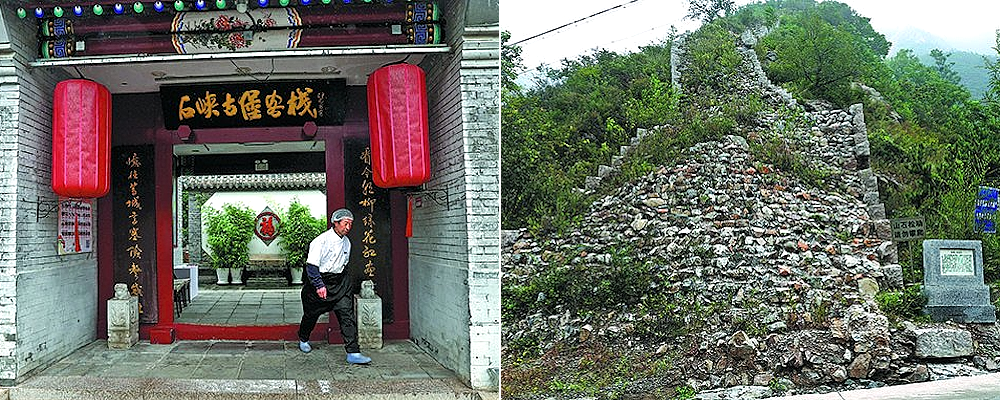
BEIJING: Residents protect iconic structure and cater to growing number of visitors, Cheng Yuezhu reports.
The Great Wall, stretching across vast swathes of time and geography, is regarded as a wonder of the world.
While standing as a testimony to China’s profound history, the winding walls still carry with them stories of the ordinary with a touch of warmth.
Just a 30-minute drive away from its famed Badaling section lies a small village held by the Great Wall in its embrace.
Surrounded by the walls on three sides, Shixia village used to be a military stronghold, first established in the Ming Dynasty (1368-1644).
For the villagers, the Great Wall is not a must-visit destination in a lifetime but an everyday sight – they can raise their heads from almost anywhere in the village and see the Great Wall meandering its way along the mountain ridges.
The village features simple and modest buildings with an antique flair, typically single-story with grey brick walls.
Yet, these buildings serve various functions that cater to those seeking diverse experiences, including a village history museum, hotels, a brewery, a café and a bookshop.
According to Li Handong, director of the village committee, the people of Shixia village have been committed to protecting its section of the Great Wall, and its development and prosperity were made possible by this heritage.
Earlier this year, Li and nine other village representatives wrote a letter to President Xi Jinping, in which they told of their love of the Great Wall, and the village’s transformation from an impoverished hamlet to a countryside getaway.
On May 14, they received a reply from Xi, applauding their effort in safeguarding the Great Wall, passing on its culture and leveraging its resources to achieve prosperity.
The president underscored the Great Wall’s role as “a symbol of the Chinese nation and an important emblem of Chinese civilisation”, embodying the spirit of unyielding perseverance and patriotic unity, while encouraging its guardians to pass down “this precious heritage left by our ancestors for generations to come”.
Liu Hongyan, a village representative and a dedicated Great Wall protector, says that she and other villagers were overjoyed by the reply, feeling immense pride.
In the meantime, reflecting on her role as a protector, she also felt the weight of responsibility.
“We were all thrilled to receive the response. Shixia is just a small, remote mountain village, so I never thought that the president would attach importance to our village, and the work we’ve done to preserve the Great Wall.
“It’s an encouragement for me and I’ll continue to protect the Great Wall and protect my homeland,” Liu says.
Her uncle Mei Jingtian, now 80, pioneered the village’s Great Wall protection efforts since 1980.
As he could not bear to see the wall crumble, Mei regularly patrolled the mountains for the past four decades, trying to prevent damage and safeguard the heritage.
“He started his voluntary patrols in 1980, the year I was born. So ever since I was little, I’d often see him pass by my house after a day of patrolling, and he’d tell me what he saw on the mountains.
“When I grew older, he’d take me along and tell me about the history and legends of the Great Wall. Over time, I developed a deep affection for it,” Liu recalls.
In 2006, Mei consulted with the village committee to establish a voluntary protectors’ team, which received enthusiastic support, with more than 40 villagers signing up.
Since then, the villagers have been regularly going on patrols to the Great Wall to tackle pollution and damage.
Now, the village has a permanent population of around 130 people, nearly all of whom are involved in the heritage protection efforts, Li says.
During these patrols, they’d dispose of litter, remove weeds, pick up and arrange the bricks that became dislodged, and report damage or hazards to cultural heritage authorities.
Liu herself is now a full-time Great Wall protector. In 2019, upon learning about a recruitment drive for Great Wall protectors in Yanqing district, she immediately signed up.
After passing a written exam, an interview and a physical fitness test, she became one of the first six individuals selected as Great Wall protectors in the village.
“I remember that on my first day, we went up to the Great Wall and saw a lot of litter, especially plastic rubbish tourists had left behind. We brought our own trash bags and each one of us collected three to four bags,” Liu says.
For five days a week, the team members go on a patrol of nearly 20 kilometers, which takes them five to six hours to complete.
During their patrols, they regularly take photos of the walls and the watchtowers, especially areas with cracks or fallen bricks, and upload the images to a specialised app linked to the cultural heritage management office of Yanqing district.
“Since becoming a full-time protector, I’ve noticed that with each trip up the mountain, the amount of litter has decreased, perhaps because of both our collective efforts and growing public awareness,” she adds.
Reciprocating the love and care given by the villagers, the Great Wall also brought the village vitalisation and prosperity.
While the village used to be very poor, with muddy roads and insufficient infrastructure, it has now become a destination for weekend retreats.
A prominent figure in the village’s tourism development is He Yuling from Yanqing district.
An entrepreneur in the catering industry in central Beijing, she observed the trend of city dwellers going to the countryside for weekends, and thought of establishing a high-quality countryside getaway.
Then, a trip to Shixia in 2014 revealed to her an ideal spot for her vision.
“At the time, the village was full of old houses and courtyards, but the local community was very welcoming, and the aging buildings were well-maintained and clean,” she recalls.
“What I saw in it was its rich historical and cultural resources. The Great Wall is visible from almost anywhere in the village, and it has historical remains. The natural scenery was stunning, with lush vegetation and flowers blooming all over the mountains in spring.”
She rented 20 courtyards from local villagers and transformed these into her own brand, the Stone Light Hotels.
Each of these courtyards has its own characteristics, but overall the designs kept the buildings’ original simplicity, cosiness and antique flavour.
Along with the guesthouses, her company also set up public spaces such as the café and bookshop to enrich the lives of residents and tourists alike, and involved the locals in establishing a brewery, a teahouse and an oil mill, which allows visitors to learn about folk culture and help the villagers sell local specialties.
Since the guesthouses opened in 2015, she has been providing villagers over 65 with an egg and a packet of milk every day, and the guesthouse employees also participate in the village’s Great Wall preservation.
“Although my hometown is 30 kilometres away from Shixia, I’ve always considered myself a local. The entire atmosphere of the village is harmonious. It feels like a big family with the villagers and the visitors,” she says.
In her observations for the past decade, what has changed about Shixia is not only the environment, but also the villagers’ increasing awareness of the preservation of their historical and cultural resources.
For the next steps, Li says that the village aims to continue to make good use of its natural and historical resources to promote economic development and rural vitalisation.
In the meantime, Great Wall preservation remains the most important.
“It is an emblem of our Chinese civilisation, and living right beside the Great Wall, we have been improving our living conditions because of it.
“ So we will continue to protect the heritage. Even when our generation grows old, the future generations will take up the baton,” Li says.

ADVERTISEMENT
ADVERTISEMENT








































